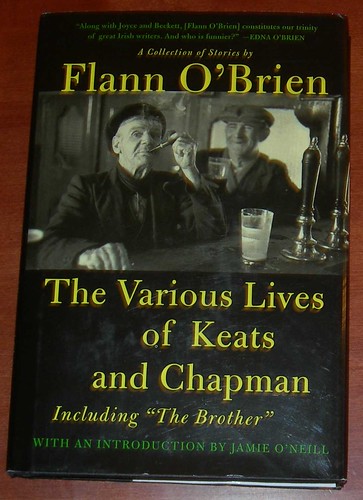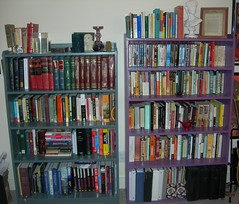166pp
At some point I crossed a line from "reader interested in Flann O'Brien" (having started as "guy who read a mention of The Third Policeman in a Grant Morrison comic") to "Flann O'Brien completist." This despite the fact that I've not yet read At Swim-Two-Birds. This book, though, is pretty much limited to the O'Brien completist in your family.
Every jacket-flap bio of Flann O'Brien I've ever read, after invoking the name of Joyce, makes mention of his Irish Times column, "The Cruiskeen Lawn." I'd imagine most of O'Brien's popularity during his lifetime, in his native country, derives from that column. God knows his books weren't met with much publishing success during his life. This book collects writings from "Cruiskeen Lawn," mostly his "Keats & Chapman" stories, but also "The Brother," a one-man play posthumously adapted from others of O'Brien's "Cruiskeen Lawn" features.
I found the "Keats and Chapman" material to be a lot of fun. O'Brien employs a very simple, unlikely premise: the poet Keats, and the translator Chapman are for some reason imagined as a comic pair (Chapman is the straight man) perpetually seeking new employment or easy wealth. In a small handful of paragraphs--most of the stories are about a page--O'Brien quickly crafts an elaborate set-up for a dreadful (if often very erudite) pun. Basically, it's the last round of the BBC's "My Word." Seeing as I actually chuckle at the punchline, "Dismissus? Leave my wife out of this!", this became my bathroom reading of choice.
As for "The Brother," it's best to keep in mind the original intented audience: Irish Times readers. A lot of the humor here plays to Irishmen's sense of Irishness. I feel like my own thorough efforts at contextualizing Ulysses give me a better-than-average insight into day-to-day Irish culture, but "The Brother" seems to be an especially rarefied exercise in local flavor & dialect. It's pretty much the kind of humor I equate with the late Lewis Grizzard. At one point, O'Brien draws on his readers' familiarity with a local advertising slogan of the times. Suffice to say, this is not what you'd expect if you just finished (& loved) The Third Policeman.

This was a Bargain Book, found on a table by the front door of a Barnes & Noble for the price of $4.95. Initially I found it depressing that a book collecting material never before published in America, by one of the Great Irish Authors of the Twentieth Century, had within a couple of years of publication found its way to this dead-end of book retail, but having read the book, it makes sense. From where I stand, it's a steal at five bucks, to be sure, but the only way of moving it off the shelves seems to be deep discounting.
